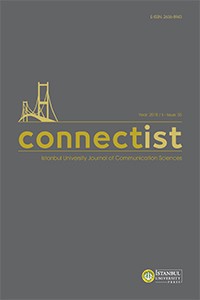Medya Etiği Eğitiminde Karşılaşılan Sorunlar: Türkiye’deki Ders İzlenceleri Üzerinden Bir Değerlendirme
Öz
Anahtar Kelimeler
Medya etiği iletişim eğitimi ahlaki akıl yürütme ders izlenceleri etik ilkeler
Kaynakça
- Akser, M., & Baybars-Hawks, B. (2012). Media and democracy in Turkey: Toward a model of neoliberal autocracy. Middle East Journal Of Culture And Communication, 5(3), 302–321. https://doi.org/10.1163/18739865-00503011
- Braun, M. J. (1999). Media ethics education: A comparison of student responses. Journal of Mass Media Ethics, 14(3), 171–182. https://doi.org/10.1207/S15327728JMME1403_4
- Canary, H. E. (2007). Teaching ethics in communication courses: An investigation of instructional methods, course foci, and student outcomes. Communication Education, 56(2), 193–208. https://doi.org/10.1080/03634520601113660
- Christians, C. G., & Lambeth, E. B. (1996). The status of ethics instruction in communication departments. Communication Education, 45, 236–243. https://doi.org/10.1080/03634529609379052
- Dağtaş, E. (2011). Üniversite-sanayi işbirliği perspektifinden Türkiye’deki iletişim eğitimine ilişkin bir değerlendirme. Akdeniz Üniversitesi İletişim Fakültesi Dergisi, 15, 32–48.
- Eres, B., & Yüksel, H. (2018, 10 Mayıs). AKP döneminde Türkiye’de değişen medya sermayesi. Retrieved from http://halagazeteciyiz.net/2018/05/10/akp-doneminde-turkiyede-degisen-medya-sermayesi/
- Hanson, G. (2002). Learning journalism ethics: The classroom versus the real world. Journal of Mass Media Ethics, 17(3), 235–247. https://doi.org/10.1207/S15327728JMME1703_05
- Goree, K. (2000). Teaching moral development in journalism education. Journal of Mass Media Ethics, 15(2), 101–114. https://doi.org/10.1207/S15327728JMME1502_4
- Kejanlıoğlu, D. B., & Taş, O. (2014). Turquie: La liberté d’expression en état de siége. Economia, 21, 42–45.
- Kostyu, P. E. (1990). Doing what is right: Teaching ethics in journalism programs. Journal of Mass Media Ethics, 5(1), 45–58. https://doi.org/10.1207/s15327728jmme0501_4
- Lambeth, E. B., Christians, C., & Cole, K. (1994). Role of the media ethics course in the education of journalists. Journalism and Mass Communication Educator, 49(3), 20–26. https://doi.org/10.1177/107769589404900303
- Lambeth, E. B., Christians, C. G., Fleming, K., & Ting Lee, S. (2004). Media ethics teaching in the century 21: Progress, problems, and challenges. Journalism and Mass Communication Educator, 59(3), 20–26. https://doi.org/10.1177/107769580405900304
- Lee, B., & Padgett, G. (2000). Evaluating the effectiveness of a mass media ethics course. Journalism and Mass Communication Educator, 55(2), 27–39. https://doi.org/10.1177/107769580005500204
- Peck, L. A., & Reel, G. S. (2013). Media ethics at work: True stories from young professionals. Washington DC: CQ Press.
- Plaisance, P. L. (2006). An assessment of media ethics education: Course content and the values and ethical ideologies of media ethics students. Journalism and Mass Communication Educator, 61(4), 378–396. https://doi.org/10.1177/107769580606100404
- Taş, O. (2017). Ahlak düşüncesi perspektifinden medya pratiği nasıl görünür? Kültür ve İletişim, 20(2), 12–42.
- Tokgöz, O. (2003). Türkiye’de iletişim eğitimi: Elli yıllık bir geçmişin değerlendirilmesi. Kültür ve İletişim, 6(1), 9–32.
- Yeşil, B. (2016). Media in new Turkey: The origins of an authoritarian neoliberal state. Urbana, IL: University of Illinois Press.
- Wyatt, W. N. (2008). Being Aristotelian: Using virtue ethics in an applied media ethics course. Journal of Mass Media Ethics, 23(4), 296–307. https://doi.org/10.1080/08900520802519836
Öz
Anahtar Kelimeler
Media ethics communication education moral reasoning syllabi ethical principles
Kaynakça
- Akser, M., & Baybars-Hawks, B. (2012). Media and democracy in Turkey: Toward a model of neoliberal autocracy. Middle East Journal Of Culture And Communication, 5(3), 302–321. https://doi.org/10.1163/18739865-00503011
- Braun, M. J. (1999). Media ethics education: A comparison of student responses. Journal of Mass Media Ethics, 14(3), 171–182. https://doi.org/10.1207/S15327728JMME1403_4
- Canary, H. E. (2007). Teaching ethics in communication courses: An investigation of instructional methods, course foci, and student outcomes. Communication Education, 56(2), 193–208. https://doi.org/10.1080/03634520601113660
- Christians, C. G., & Lambeth, E. B. (1996). The status of ethics instruction in communication departments. Communication Education, 45, 236–243. https://doi.org/10.1080/03634529609379052
- Dağtaş, E. (2011). Üniversite-sanayi işbirliği perspektifinden Türkiye’deki iletişim eğitimine ilişkin bir değerlendirme. Akdeniz Üniversitesi İletişim Fakültesi Dergisi, 15, 32–48.
- Eres, B., & Yüksel, H. (2018, 10 Mayıs). AKP döneminde Türkiye’de değişen medya sermayesi. Retrieved from http://halagazeteciyiz.net/2018/05/10/akp-doneminde-turkiyede-degisen-medya-sermayesi/
- Hanson, G. (2002). Learning journalism ethics: The classroom versus the real world. Journal of Mass Media Ethics, 17(3), 235–247. https://doi.org/10.1207/S15327728JMME1703_05
- Goree, K. (2000). Teaching moral development in journalism education. Journal of Mass Media Ethics, 15(2), 101–114. https://doi.org/10.1207/S15327728JMME1502_4
- Kejanlıoğlu, D. B., & Taş, O. (2014). Turquie: La liberté d’expression en état de siége. Economia, 21, 42–45.
- Kostyu, P. E. (1990). Doing what is right: Teaching ethics in journalism programs. Journal of Mass Media Ethics, 5(1), 45–58. https://doi.org/10.1207/s15327728jmme0501_4
- Lambeth, E. B., Christians, C., & Cole, K. (1994). Role of the media ethics course in the education of journalists. Journalism and Mass Communication Educator, 49(3), 20–26. https://doi.org/10.1177/107769589404900303
- Lambeth, E. B., Christians, C. G., Fleming, K., & Ting Lee, S. (2004). Media ethics teaching in the century 21: Progress, problems, and challenges. Journalism and Mass Communication Educator, 59(3), 20–26. https://doi.org/10.1177/107769580405900304
- Lee, B., & Padgett, G. (2000). Evaluating the effectiveness of a mass media ethics course. Journalism and Mass Communication Educator, 55(2), 27–39. https://doi.org/10.1177/107769580005500204
- Peck, L. A., & Reel, G. S. (2013). Media ethics at work: True stories from young professionals. Washington DC: CQ Press.
- Plaisance, P. L. (2006). An assessment of media ethics education: Course content and the values and ethical ideologies of media ethics students. Journalism and Mass Communication Educator, 61(4), 378–396. https://doi.org/10.1177/107769580606100404
- Taş, O. (2017). Ahlak düşüncesi perspektifinden medya pratiği nasıl görünür? Kültür ve İletişim, 20(2), 12–42.
- Tokgöz, O. (2003). Türkiye’de iletişim eğitimi: Elli yıllık bir geçmişin değerlendirilmesi. Kültür ve İletişim, 6(1), 9–32.
- Yeşil, B. (2016). Media in new Turkey: The origins of an authoritarian neoliberal state. Urbana, IL: University of Illinois Press.
- Wyatt, W. N. (2008). Being Aristotelian: Using virtue ethics in an applied media ethics course. Journal of Mass Media Ethics, 23(4), 296–307. https://doi.org/10.1080/08900520802519836
Ayrıntılar
| Birincil Dil | Türkçe |
|---|---|
| Konular | İletişim ve Medya Çalışmaları |
| Bölüm | Araştırma Makaleleri |
| Yazarlar | |
| Yayımlanma Tarihi | 28 Aralık 2018 |
| Gönderilme Tarihi | 14 Ağustos 2018 |
| Yayımlandığı Sayı | Yıl 2018 Sayı: 55 |


